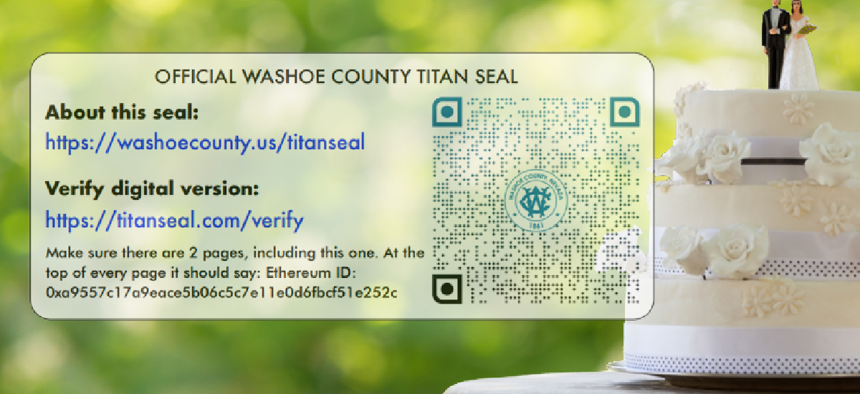Marriage certificates sealed by blockchain

Hunter Halcomb, the head of IT for the Washoe County Recorder’s Office, spoke with GCN about the challenges of putting marriage certificates onto a blockchain-based system.
In 2018, Washoe County, Nev., was looking for a new way to distribute marriage certificates to county residents. At a conference, former Washoe County Recorder Larry Burtness met the CEO of Titan Seal, a startup that secures PDFs by creating a hash of the certificate into the memo field of a blockchain transaction. They worked together on a pilot to put marriage certificates on a blockchain-based system.
GCN spoke with Hunter Halcomb, department systems technician for the Washoe County Recorder’s Office, to learn more about how the project was completed and some lessons learned.
Halcomb’s answers have been edited for length and clarity.
GCN: What's the advantage of a blockchain-secured digital certificate?
Halcomb: The Recorder's Office stores marriage certificates, which are the proof that you’ve gotten married in Washoe County. People need these certificates to prove that they have gotten married and to show what their name was before and after their marriage. They will call, fax or email us to ask for a copy, and when they do, we tell them we are going to send them the paper certificate and that we can send them a digital one that they will get today.
GCN: Why did the office choose this system?
Halcomb: Titan Seal uses an Ethereum blockchain because it is built from the ground up to have applications built on top of it -- not just financial transactions. Also, at the time that we implemented it, the per-transaction fees were lower.
GCN: What were some of the surprises that came out of your pilot process?
Halcomb: We learned that not [every agency] is ready to receive digital documents. We do need to let other agencies know that we are going to be issuing marriage certificates on the blockchain, what they look like and to be ready for them. Some of those agencies have not received any digital documents, so I think communication is key here. People need to understand what blockchain is, its potential and how these documents are more secure than paper documents that we issued before.
GCN: Did you face any challenges with training staff on the system?
Halcomb: The employees in our office were not used to dealing with digital documents up to this point. We did offer some documents digitally, but not certified ones. There were processes to be put into place to teach people how to get these files into their email and in between computers in the office. We needed a new workflow to be able to work with these documents.
GCN: What was the response from Washoe County residents?
Halcomb: I was surprised by how many people accepted these documents right off the bat. If you have something new and demonstrably better, some people are still going to be skeptical. We have a 63 percent approval rate as of now. Getting customers to say that they wanted a blockchain-based marriage certificate was easier than we thought. Once we started offering it to everybody, almost everyone did want one. A couple of weeks after we send someone a Titan Seal certificate, I send them a follow up email asking them if the government agency they presented this document to accepted it.
GCN: What are the next steps?
Halcomb: Our next step is to apply this same technology to our record archives. We keep every deed and marriage certificate that has ever been recorded in Washoe County back to 1862. We need to keep those documents forever. We need a way to make sure that these documents are not tampered with.
We record approximately 7,000 marriage certificates a year. The record archive is 17 billion pages of information. We don’t have a complete page-level inventory of our library, but we have about 3,300 books and approximately 7,500 rolls of microfilm.
We are going to use the Titan Seal technology to seal all of those document archives so if there is ever an emergency where the documents in this office are not accessible and [people] need to go to the archive, then they know with the blockchain that those documents cannot be tampered with.
NEXT STORY: Blockchain to speed medical research





